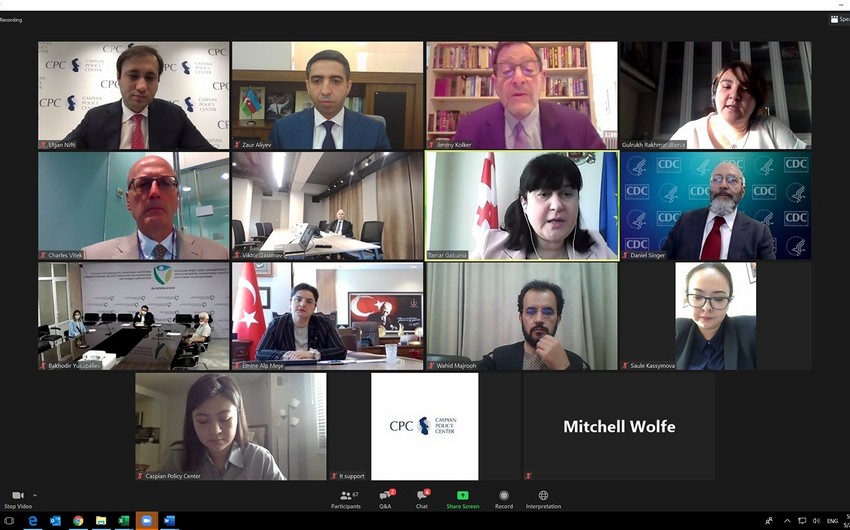Today, the Caspian Policy Center (CPC), in coordination with the embassies of Afghanistan, Azerbaijan, Georgia, Kazakhstan, Turkey, and Uzbekistan, convened senior experts from the White House Coronavirus Task Force, U.S. Centers for Disease Control and Prevention (CDC), U.S. Department of Health and Human Services, and health policy officials from Afghanistan, Azerbaijan, Georgia, Kazakhstan, Turkey, and Uzbekistan to discuss the current COVID-19 pandemic in the Caspian region and its potential implications for health policies.
The report says that CPC's Executive Director, Efgan Nifti, opened the event with welcome remarks followed by introductory comments from the panelists.
"The countries of the Caspian region are facing severe public health challenges posed by the spread of the global COVID-19 pandemic. Effectively addressing these challenges requires a holistic approach and strong cooperation both within the region and with global partners," Mr. Nifti said.
Mitchell Wolfe, Chief Medical Officer at the U.S. Centers for Disease Control and Prevention (CDC); Daniel Singer, Regional Director for Central Asia at the CDC; Charles Vitek, the White House Coronavirus Task Force Coordinator; Wahid Majrooh, Deputy Minister of Public Health of Afghanistan; Viktor Gasimov, Deputy Minister of Healthcare of Azerbaijan; Zaur Aliyev, Chairman of the Board of the State Agency for Mandatory Health Insurance of Azerbaijan; Tamar Gabunia, First Deputy Minister of Internally Displaced Persons from the Occupied Territories, Labor, Health and Social Services of Georgia; Saule Kassymova, Acting Director of the Department for Strategy and International Cooperation of Kazakhstan; Emine Alp Meşe, Deputy Minister of Health of Turkey; and Bakhodir Yusupaliev, First Deputy Minister of Health of Uzbekistan were among the webinar panelists who talked on the current state of the COVID-19 pandemic in the Caspian region, shared their experiences in containing the virus, and discussed innovative solutions to economic and social recovery.
We hope to add an extra level of resources and communications to advance every country's ability to improve biosecurity and coordination and limit the impact of this infectious disease that is a translational threat," said Charles Vitek, White House Coronavirus Task Force Coordinator
"Addressing COVID-19 has been a lesson in the connectedness of countries around the globe, and I think that we will use this opportunity to strengthen our global health programs. A disease anywhere is a disease threat everywhere," added Mitchell Wolfe, Chief Medical Officer at CDC.
"Our support to this region is not just an investment in those nations, it's an investment in the health of America and the whole world," said Daniel Singer, Regional Director for Central Asia at CDC.
The webinar, moderated by Ambassador (ret.) Jimmy Kolker, former Assistant Secretary for Global Affairs at the U.S. Department of Health and Human Services and U.S. Deputy Global AIDS Coordinator, stimulated fruitful discussion on the mechanisms introduced by countries in the Greater Caspian Region to mitigate the impact of the COVID-19 pandemic.
Many countries in the region managed to contain the virus's spread by implementing strict social-distancing measures and introducing a comprehensive multi-sector program to address any negative externalities resulting from these measures.
"The post-crisis plan entails innovative approaches to remodeling service delivery to make sure that we use more technology and go with distant communication online," said Tamar Gabunia, First Deputy Minister of Internally Displaced Persons from the Occupied Territories of Georgia.
We have placed our efforts to reach the communities (to increase health awareness) through different approaches through the involvement of religious leaders and community members," said Wahid Majrooh, Deputy Minister of Public Health of Afghanistan.
"In this challenging time, we urge all states to maintain friendship and mutual support and solidarity," said Zaur Aliyev, Chairman of the Board of the State Agency for Mandatory Health Insurance in Azerbaijan.
"We are taking actions to make our health system more robust for the possible second wave of COVID-19 by integrating primary healthcare in the overall public health response," said Saule Kassymova, Deputy Director of the Department for Strategy and International Cooperation of Kazakhstan.
During the webinar, the panelists highlighted the effectiveness of the social-distancing policies in Azerbaijan, Georgia, Kazakhstan, Turkey, and Uzbekistan. They shared their experiences in managing the challenges due to the pandemic and innovative solutions to economic and social recovery. These include promoting electronic commerce sectors and ensuring the workforce's preparedness and resilience.
In anticipation of the second wave of the COVID-19 transmissions, governments in the Greater Caspian Region actively work to increase testing capabilities, health system capacity, and social programs to aid vulnerable populations. The webinar discussion also examined the need for regional and international cooperation and assistance as the Greater Caspian Region seeks to contain the virus's spread and support citizens and businesses impacted socially and economically by the containment measures.
The Caspian Policy Center (CPC) is an independent, nonprofit research think tank based in Washington D.C. Economic, political, energy, and security issues of the Caspian region constitute the central research focus of the Center. CPC aims at becoming a primary research and debate platform in the Caspian region with relevant publications, events, projects, and media productions to nurture a comprehensive understanding of the intertwined affairs of the Caspian region.
With an inclusive, scholarly, and innovative approach, the Caspian Policy Center presents a platform where diverse voices from academia, business, and policy world from both the region and the nation's capital interact to produce distinct ideas and insights to the outstanding issues of the Caspian region.


 https://images.report.az/photo/5bdae1e6-e1ba-4038-8701-a271d4cffda7.jpg
https://images.report.az/photo/5bdae1e6-e1ba-4038-8701-a271d4cffda7.jpg

